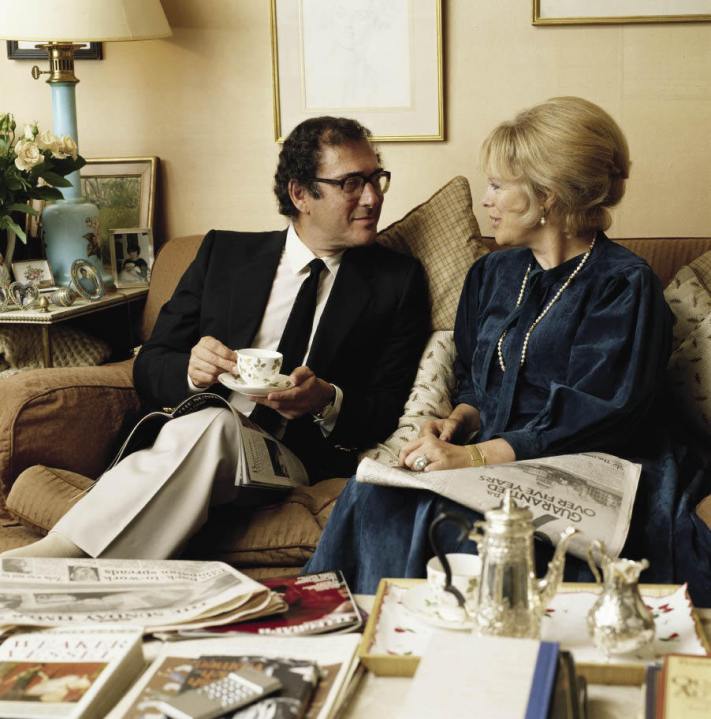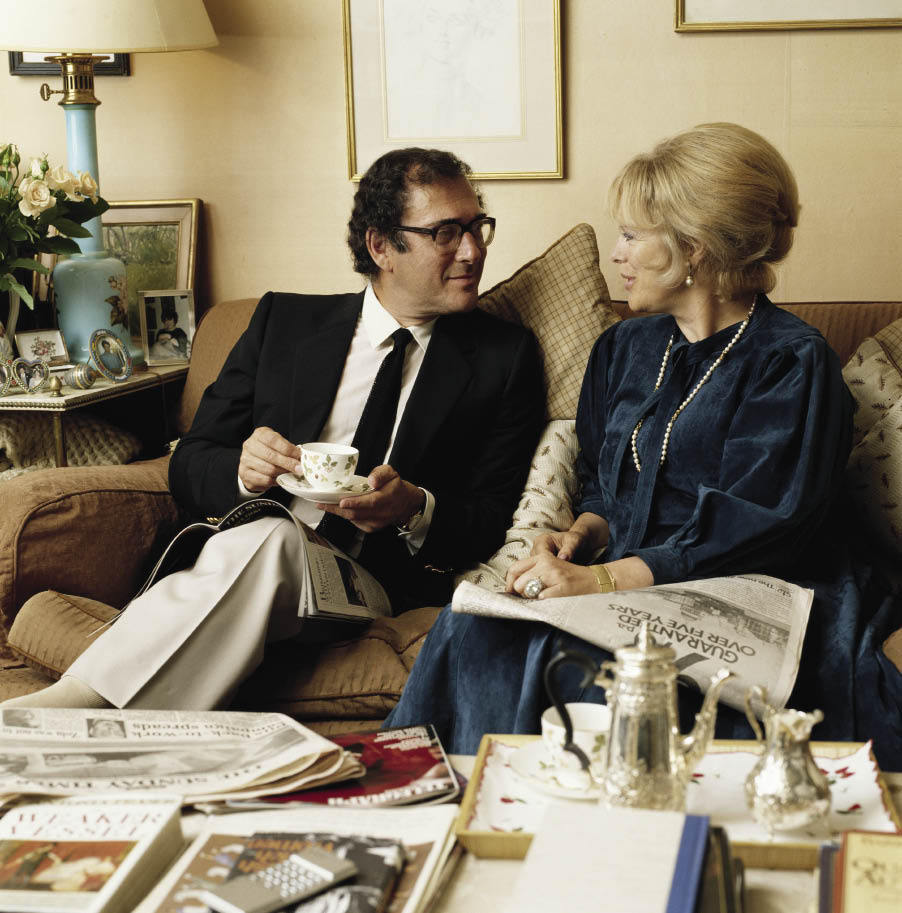Towards the end of 1979, Antonia Fraser gave an interview to the Washington Post in connection with her book Charles II (renamed ‘Royal Charles’ so as not to confuse a sequel-bombarded American public). She records her final exchange with the interviewer in the tersely effective style of the diaries from which this book is adapted:
Man, hopefully, at the end: ‘Just one more question, what is Harold Pinter like about the house, all those pauses and enigmatic statements, I’ve always wondered?’ Me, briskly: ‘Keep wondering.’
‘Keep wondering.’ Excellent phrase: curt, witty, and just abrupt enough to see off a line of inquiry without giving offence. Her husband would, you’d have to imagine, have responded with a robust Anglo-Saxonism.
And there’s the reason that this book is so interesting: we did keep wondering, all of us. What was it with those two? We need wonder no more. As an act of memorial devotion, Lady Antonia has turned her daily diaries into this memoir of their 33-year relationship.
It takes you through from their pursuit by the tabloids, their patient but determined struggle to reconcile their friends and families to their relationship, their years of political activism, a good few cricket matches, a lot of meals out, the odd Nobel Prize. Plus, of course, constant reading and writing: a mutual pleasure in, and seriousness about, literature. One of the things that comes through most strongly is how focused and how sheerly happy Pinter was when writing.
This book — full of funny and tender things — satisfies on more than one level. It is an intimate account of the life and habits of a major artist; it is a pencil sketch of British high society in the second half of the 20th century; and it is, more than either of these things, and much more unusually, a wonderfully full description of the deep pleasures and comforts of married love.
‘Must you go?’ were the first words Pinter spoke to Fraser, as she made to leave a dinner after the first night of The Birthday Party in January 1975. She decided that, no, she didn’t have to go after all, and that was that.
Both were already married — she, companionably, to the Tory MP Hugh Fraser; he, more unhappily, to the alcoholic actress Vivien Merchant. Both were already in early middle age — Antonia was a mother of six — and had romantic histories in and out of marriage: ‘Harold and I had, and needed to have, an unspoken amnesty where our respective pasts were concerned.’
What might have been expected to play out as another discreet affair became a passion, then a scandal — stoked by Vivien’s bitter briefings to the press — and then a long and happy marriage.
They did, no question, seem an odd couple in the public account of it; and the private account of it only half dispels that impression. On the one hand there was Fraser, a swooning romantic, an off-and-on Catholic, and a bit of a hippie: consulting her horoscope and the I-Ching, wondering about the significance of a full moon, and picturing herself from time to time as Titania or the Angel Gabriel in a Pre-Raphaelite painting.
Then, on the other hand, there was Pinter. ‘Harold is saturnine,’ Fraser writes with approval in an early diary entry. Here was the fire-breathing, black-clad, godless, depression-prone confrontationalist we all think we know — the sort of man who sits down with V. S. Naipaul to ‘discuss anger like one might discuss a taste for port’.
Yet Pinter was, as it turns out, incredibly uxorious — as consumed by his devotion to Antonia as he was by his need to shout the ears off passers-by about human rights abuses in Chile. He wrote her love poems, and read them to her in public. Like a mantra, he repeated aloud his belief that he was ‘the luckiest man alive’. Fraser quotes
a phrase taught me years ago … about a man we knew: Hausteufel, Engelstrasse: it describes a domestic tyrant, much loved by the outside world. Tell Harold he is the opposite: ‘House angel, street devil.’
The two did complement each other. She both buoyed his spirits and kept him in check: it’s clear that she was very capable of saying (indeed, of writing on a place- mat and sliding it discreetly across the dinner table to her thunder-faced other half): ‘Oh do SHUT UP!’ And for her? Fraser’s brother Thomas Pakenham, very early in the relationship, said something shrewd: ‘You have a special problem. You are a woman and a strong character, yet you want your husband to be stronger.’
As Fraser herself amusingly points out, part of the fun of Harold was that most great writers don’t actually behave according to the stereotype of the great artist — whereas Pinter actually did. Perhaps self-consciously so.
After dinner in New York in 2001, James Fenton’s partner, Darryl Pinckney, told them both: ‘For scary people you’re really a lot of fun.’ Fraser responded: ‘Oh, but underneath we are really much scarier than you think.’ Pinter: ‘Nonsense. I intend to be a pussycat, Uncle Cuddles.’
Walking in Kew Gardens in winter sunshine, on another occasion, the couple saw a notice saying ‘The wildlife may attack you at certain seasons of the year.’ ‘Harold points to it: “But I am in a mellow mood.” ’ Here’s a Pinter who mocks his own reputation — though not without taking pride in it.
There’s lots of top-quality Pinterania of that sort. From pub-quiz titbits — he voted for Mrs Thatcher; he had a pathological loathing of flies — to elegantly told comic vignettes. Here he is after a press conference:
Harold went upstairs and collapsed. I learned later that the questioning went like this. Man: ‘The first performance of The Caretaker was at the Royal Court, wasn’t it?’ Harold: ‘No.’ Man: ‘What is interesting is that my father had a pub just round the corner from the Royal Court.’ Harold: ‘Oh.’ He flees and meets second interviewer in the lift. Second interviewer: ‘Ho, ho, now you can’t escape me.’ Harold: ‘Oh, yes I can,’ and so on. And so he did.
There’s also more serious stuff. Fraser bears witness to Pinter’s long professional friendship with Simon Gray, his cordial relationship with Samuel Beckett (whose spry, gnomic table-talk is here to delight in), and his encounters with Vaclav Havel and Orhan Pamuk. A fragmentary exchange with Tom Stoppard tells you something about both playwrights. When it’s suggested to Pinter that the swearing in No Man’s Land must be something in his own character, he responds: ‘But I don’t plan my characters’ lives.’ Turning to Stoppard, he says: ‘Don’t you find they take over sometimes?’ Stoppard: ‘No.’
The final part of Must You Go? describes the baleful fortitude with which Pinter endured a long series of illnesses and setbacks — cancer, an auto-immune disease, a series of falls. It is piercing.
Near the end of his life, he is told that drink will kill him. For 37 days, he’s on the elderflower wine, suffering — ‘In order to live. And with you.’ Then, finally, he is told that he is dying and whether he drinks or not won’t make a difference. He goes home and they open a bottle of champagne. ‘Oh, the enjoyment of this glass!’ he exclaims. ‘I had forgotten how absolutely lovely champagne was.’
A week later, he is on his deathbed, his wife alone in the room with him:
Suddenly the rattling stopped. Harold opened his black eyes very wide, almost staring, although he didn’t respond when I spoke to him as before: ‘It’s me, Antonia, who loves you.’ Then he went quite tense, his whole body. Finally he went still and silent.








Comments